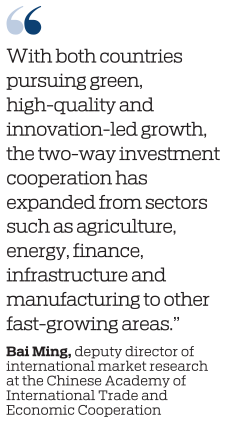
Fueled by complementary trade, joint interests and vast cooperation potential, closer economic and trade ties between China and Thailand will benefit the two countries in the long run, said analysts and business leaders.
With the two sides making notable progress in big-ticket projects — including the China-Thailand Railway and a number of manufacturing and energy programs — they said that enhanced business relations will create vitality and stability to ensure supply chains across the Asia-Pacific region and the world in years ahead.
Thanks to the tangible growth of the Belt and Road Initiative and the Regional Comprehensive Economic Partnership, as well as their complementary goods trade, China-Thailand trade grew by 3 percent year-on-year to $134.99 billion in 2022, data from China's General Administration of Customs showed.
The RCEP, the world's largest free trade deal, covers 10 member states of the Association of Southeast Asian Nations and its five free-trade agreement partners: China, Japan, South Korea, Australia and New Zealand.
The implementation of this agreement will not only bring tariff cuts to Thai exporters, but encourage Chinese manufacturers to ship more goods to Thailand, said Hong Junjie, vice-president of the University of International Business and Economics in Beijing.
In addition to agricultural products, Thailand's exports to China include rubber, chemicals, raw materials for plastic goods, data storage devices, automotive parts, integrated circuits and refined oil, according to customs statistics.
China ships mainly computers, telecommunication equipment, trains, diesel oil, steel, lighting products, medical equipment, textiles and household appliances to Thailand. Its passenger vehicles and trucks have also become popular in the Southeast Asian country in recent years.
"With both countries pursuing green, high-quality and innovation-led growth, the two-way investment cooperation has expanded from sectors such as agriculture, energy, finance, infrastructure and manufacturing to other fast-growing areas," said Bai Ming, deputy director of international market research at the Chinese Academy of International Trade and Economic Cooperation.
He said these areas include trade in services, the production of electric vehicles, 5G, big data and cloud computing, with scientific and technological innovation acting as a driving force.
For instance, Chinese carmaker BYD is building a plant in Thailand. After its completion in 2024, vehicles manufactured from this factory will be sold nationally and exported to other Southeast Asian economies.
"Thailand has a solid base in the automotive industry with mature manufacturing capabilities, so we chose to build a factory here after careful deliberation," said Liu Xueliang, general manager of BYD Asia-Pacific Auto Sales Division.
As China has created more favorable conditions for global companies to grow in its vast market, Thailand's beverage company TCP Group announced in July that it added investment to its new production base in Nanning, the capital of South China's Guangxi Zhuang autonomous region. The company is betting on the Chinese market for greater growth.
The move marked the Thai company's expansion into the country and moved its total investment in the Chinese market to 3.3 billion yuan ($451 million) over the past two years.
The new production base covers an area of about 90,000 square meters and is estimated to become one of the most important producers of TCP's Red Bull energy drinks. Notably, it is equipped with four fully automatic production lines.
Saravoot Yoovidhya, CEO of TCP Group, said that the Chinese government has created a market-oriented and world-class business environment governed by a sound legal framework. Such efforts undoubtedly injected stronger impetus to the development of TCP Group and other multinational corporations in China.
China and Thailand are also deepening cooperation in the digital economy. For instance, their businesses are working together to develop digital projects such as "smart" transportation, tourism and healthcare in Thailand. Meanwhile, cross-border e-commerce platforms have been introduced in the Southeast Asian nation so farmers can use them to sell their produce and increase their incomes, according to information released by the Beijing-headquartered China Council for the Promotion of International Trade.

